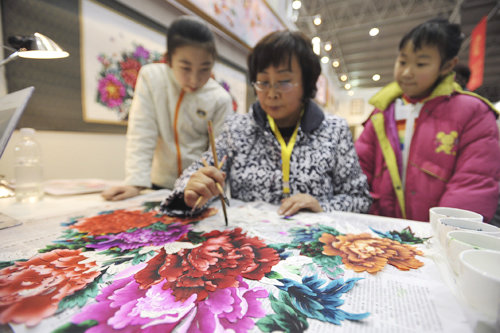|
 |
|
ON-SITE LEARNING: Zhou Shuying, the inheritor of Yuxian paper craft, colors her work at the exhibition held in National Agriculture Exhibition Center in downtown Beijing on February 5 (LIU CHANGLONG) |
Zhou Shuying, a Yuxian jianzhi (paper cutting) inheritor from Yuxian County in north China's Hebei Province, is recognized by the United Nations Educational, Scientific and Cultural Organization (UNESCO) as a master of folk handicraft, and won many domestic and international awards.
Yuxian jianzhi, dating back to Ming Dynasty (1368-1644), stands out in Chinese paper craft, and involves many traditional skills such as drawing, engraving and coloring in addition to intricate cutting techniques.
"The theme of paper works depends on the graphics. Images like children, gourds and lotuses represent flourishing families. Poultry, livestock, fish, insects and fruit are also common images for paper cutting." Zhou said.
She kept on learning and creating paper works during the difficult early years of her career. "I paid to exhibit my own works," Zhou noted.
After several years' experience and study, Zhou's improved skills produce works reflecting people's daily life and bring Yuxian County's traditional craft up-to-date.
For the future of Yuxian's paper-cutting tradition, Zhou tends to be positive, especially in light of recent government support.
Different from Zhou, many craftsmen use computers to design and cut papers by machine, which seems to be more productive and profitable.
"The machine can make it within several minutes, while we need several years or even decades to improve our skills. But works by hand are more delicate, vivid and colorful. That's far beyond a machine's capabilities," Zhou noted, "We must hype handicrafts and raise people's understanding that the cultural element is impossible to get across mechanically."
Zhou founded a paper-craft museum in Yuxian County with her family to promote the folk art. Her museum shows the development of Yuxian paper cutting with artworks, photos, words and models.
She also has over 80 apprentices in the museum, and among them two are acknowledged as folk artists by UNESCO and eight are nationally recognized paper-cutting artists.
Zhou doesn't forget her responsibility as an inheritor of her craft. She hopes to establish a school of paper craft, helping this intangible treasure to flourish and cultivate new heirs to the legacy of Yuxian paper cutting. | 